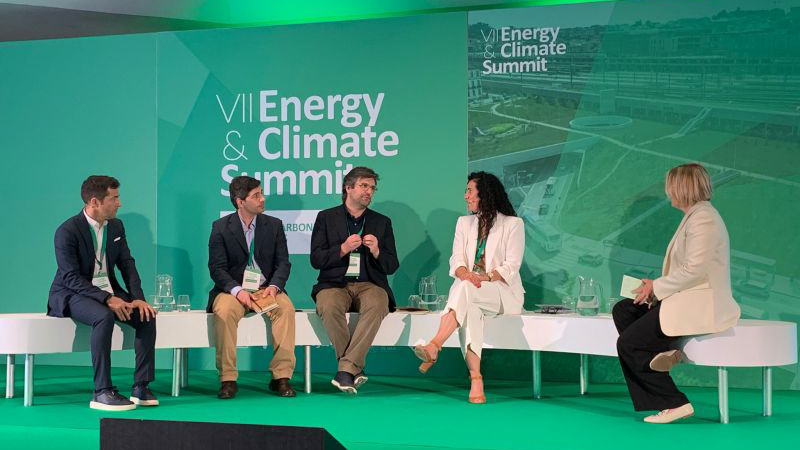Did you know that main urban areas are responsible for 70% of greenhouse gases? The city of Porto is no exception; and that’s why the city welcomed the “Decarbonisation of Cities”, during the 7th Energy and Climate Summit. Dozens of experts came together to share their experience in addressing current decarbonisation challenges, and INESC TEC did not miss the call: João Peças Lopes and António Baptista, INESC TEC researchers, participated as speakers in two of the three panels, sharing their knowledge about energy transition and green economy.
During the event (Alfândega do Porto), participants had the opportunity to explore proposals and perspectives within three debate panels: “Energy Transition of Cities”, “Urban Planning and Mobility” and “A greener economy in cities”. In the current context of climate emergency, all stakeholders agreed that the decarbonisation of cities is essential to ensure the decarbonisation of the economy and society. And, according to António Baptista, Portugal has been a leading example in Europe, when it comes to accelerating the actions to tackle climate change. “We have invested in more demanding roadmaps, with higher decarbonisation rates. The challenges in the United Nations 2030 Agenda and the European Green Deal are very ambitious; however, Portugal has the resources (academia, research institutes and government plans) required to move towards more sustainable economic and environmental development”.
In his speech, João Peças Lopes, associate director of INESC TEC, focused on energy transition, claiming that “the decarbonisation of cities is largely done through electrification, using renewable-based energy”. One of the ways to ensure this production is, for instance, by integrating solar panels in buildings – not only within the private sector, but also concerning city authorities, public bodies, etc. However, there is still a lot to explore when it comes to citizen engagement. “Although the incentives are already very interesting, they are not enough, mainly because there is still a lot of energy illiteracy. In addition, it is not enough to install solutions for the production of renewable-based electricity; it is necessary to adopt an infrastructure to distribute said energy, and make it reach new consumers, e.g., owners of electric vehicles”. A challenge mainly targeting network operators, whose success also involves the digitalisation of economy.
In the panel “A greener economy in cities”, António Baptista spoke about INESC TEC’s involvement in the RENEE HEU project, which aims to use advanced robotics and AI to make European industry more sustainable through remanufacturing. “At the moment, the climate emergency requires major changes and a sense of urgency in the adoption of new strategies – in this case, in the industry sector. In this sense, remanufacturing will act as another barrier to linear economy, as part of a set of strategies – “The R Strategies” – that aims to increase circularity and support the implementation of circular business models. One of the ideas is – thanks to our technological and production competences – to design the products so that their lifespan can be substantially longer, with several use stages before their end of life”. Redesigning products to extend their life cycle and rethinking business models: this is one of the keys to a more circular and environmentally sustainable economy.
Organised by the Energy and Climate Forum, the Energy and Climate Summit is an international conference that aim to disseminate scientific knowledge, success stories and sustainable practices to Portuguese-speaking countries. The next one will take place in September, in Rio de Janeiro.


 News, current topics, curiosities and so much more about INESC TEC and its community!
News, current topics, curiosities and so much more about INESC TEC and its community!